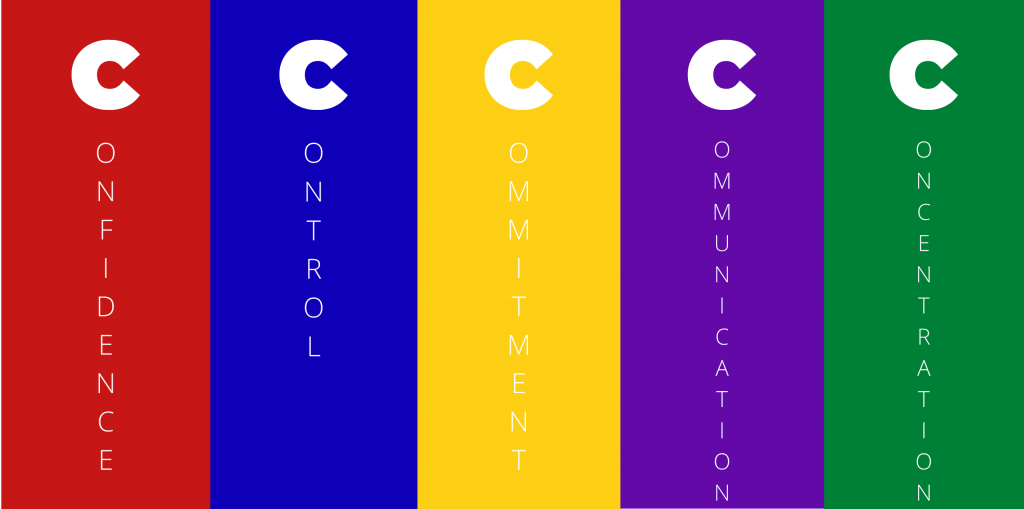I recently had the pleasure of delivering a series of workshops to a group of talented academy football players. While still young, these players are expected to represent the academy in the same way as senior players represent their club. They live, breathe and play football, all while juggling the demands of school and outside life, in the hope of representing a club as they get older. Pretty impressive mindset to me…
My job was to introduce sport psychology to them in way that would be engaging and not boring. Engaging a youth team in person is quite easy, but not so much over a Zoom call.
However, a principle which I was able to introduce was the 5Cs or player development.
Simply, they are 5 constructs, all beginning with C. These are: –
- Communication
- Commitment
- Control
- Concentration
- Confidence
But why are they important?
Well, the best footballers are those who are able to: regulate their emotions, utilise effective interpersonal skills, fix their attention, and remain highly motivated and self-assured when faced with consistent challenges. These behaviours are what can be expected in mentally tough, emotionally intelligent players.
In a nutshell, those who have a greater grasp of the 5Cs will in a better position to reach their full potential.
Now while we all have the ability to develop their grasp of the 5Cs, they are not innate. When I say this, I mean that we are not born with a developed understanding of these. Instead, we become aware of them as a product of our long-term development.
If some of this is hard to understand at first (don’t worry if so, it can be at first) the take home message from this is that these can be coached and nurtured, whatever age you are or level you play at, in whatever sport you participate in. Turns out you can teach and old dog new tricks, it just depends if they are willing to learn!
How do they improve a player?
Let’s go through them.
Communication – How we speak to each other. For a footballer, this could be on the pitch, or in training. As well as to others on our team, or the opposition. Communication helps develop relationships, promote unity and effective communication can increase success. This can further be split into 2 types. Verbal communication is spoken communication. It can involve telling a teammate to pass, shouting encouragement, instructions from coaches and other players. Meanwhile, non-verbal communication means things like body language, and eye contact. For example, eyeing up the opposite corner to trick a goalkeeper when you’re taking a penalty. Communication can be improved through commitment, patience and openness.
Commitment – The amount that you are dedicated to the cause. This is driven by your motivation, which can be intrinsic (motivation from personal factors like enjoyment, competition) and extrinsic (motivation from outside factors, like making parents proud or payment). Motivation can be driven by goals that we set ourselves to improve and develop.
Control – We can control ourselves physically and mentally. By improving our physical control, we can gain control over our actions. For example, our movement, positioning and tackling. Improving our mental control can help up regulate our emotional responses, such as frustration and anger. By improving our control of both of these, we are able to react rationally on and off the pitch. This can guard players against reacting badly to a mis-timed tackle from a player, or insults from the opposition, which wouldn’t only see you punished but also see your team at a disadvantage because of your actions.
Concentration – The ability to focus on thoughts, feelings, and information that is relevant to your performance. The human mind can only deal with a certain amount of information, so it’s important to only focus on the things that are relevant to good performance when playing. Focussing on the crowd noise or what an opposition player is trying to say in your ear doesn’t leave room for relevant details. What you find relevant it down to you, but common, important things to focus on are: team positioning, opposition movement, your next move.
Confidence – The belief that we are capable of doing something, and influences effort, resilience, emotional state and even how the opposition see you. This shouldn’t be confused with arrogance. A confident performer displays effort, persists and challenges, remains committed and increases effort after dispossession.
Going forward
These kinds of models could have me talking for pages and pages, but that would just bore you senseless, which I promise is not my intention! Instead, I have given you a quick tour of the 5Cs, much like the one I gave to the academy players.
Hopefully from these explanations you can begin to see how a player that displays greater understanding of the 5Cs can become a better player. Having the knowledge and self-awareness as to which you are better at and which you can still develop is a powerful tool that you can have at your disposal. While I have said that these can be applied to players of all abilities and stage of career in any sport, the great thing about the 5Cs is that they can be used in wider life too!
Take some time after reading this and see how they can apply to you inside and outside of sport. As if one set of 5-a-day wasn’t enough…
While you’re here, how about having a look at my article on Controlling the Controllables? A great way to help develop one of your Cs!

